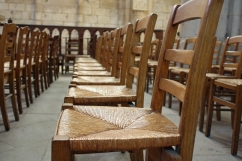
If you've grown up in a conservative Christian home, especially in America, there's a good chance that you were told that the man has the primary calling in the family. If someone is going to work full time or take on a job that requires a family to relocate, it's going to be the man.
I can't point to any particular scripture verse that supports this career-based application of male headship, although I am very familiar with some scripture verses that support this view – as well as many others that, in my view, disprove the overall concept of male headship. More often than not, I've heard many sympathetic to male headship explain the burden of the male to take on the primary career as a result of the curse in Genesis 3 – an argument that should fall apart if we're going to take the New Testament seriously where Jesus frees us from the curse.
Regardless of these biblical arguments, we have another measure for evaluating the worthiness of a perspective: the "fruit" or outcome (Matthew 7:16). If a particular teaching leads to faith, hope, and love, then it is most likely true. A theologian no less than St Augustine shared that love should be our guideline for interpretation, and we could say that the opposite is also true: if a teaching results in judgment, bondage, and hopelessness, then it is most likely not true.
In 2007 my wife and I had just purchased a home in Vermont, and we were both labouring at demanding jobs that left us weary and crunched for time. I was particularly ill-suited for the nonprofit job that had become a plan B after attending seminary and realising I didn't fit in as a pastor. I was more or less at a dead end in my career.
My wife and I have always viewed ourselves as equals before God, both fully reflecting the image of God (Genesis 1:27). We submit ourselves to God and move together under the Spirit's direction rather than seeing the man as the chief decision maker and financial provider. Some years I've made more money than her and some years she makes more money than I do. However, I still carried a heavy burden from the teaching that I was supposed to be the provider for my family. I couldn't leave my position even if it appeared to be a real dead end in a very unstable organisation. I didn't know what to do, and I couldn't figure out a way to make my actual job skills fit into any particular job.
Then, six months after buying our home, my wife brought up an idea: "I think I need to go back to school for my PhD."
My head began to spin. Would we have to sell our house? (we did); Would have to move a lot? (we just finished our fourth move since then); What would I do? (no idea).
That last question didn't have any easy answers, but as my wife asked me to pray with her about pursuing a PhD programme, I also found an opportunity to hit the career reset button along with her. The truth was that I still believed deep down that breaking out of my nonprofit job and starting from scratch in a new field would prove that I'm a failure. I imagined myself being one of the only men from my graduating class without a steady salary or a clear plan for my career.
Knowing that my wife felt peace about starting over again with her career, I joined her in prayer. As we prayed and discussed the future, I finally realised that I needed permission to take the leap into writing full time. This wasn't just the perfect fit for my job skills and background. This was also the perfect fit for our family since my job is portable, able to move with an academic job – which she begins this fall.
If I had fully bought into the teaching that the man has the primary calling and, most importantly, if my wife had bought into it as well, we would have most likely continued to struggle through our jobs in Vermont far longer than necessary. Most importantly, the burden of providing for my family would have kept me from taking a leap of faith to begin writing full time.
Moving forward together in prayer, viewing our careers as a partnership, has given us both the freedom we need to remain open to our gifts and callings. Neither of us has had to make dramatic sacrifices of our identities, gifts, or careers. Rather, we are both free to pray together about our future and to make daily sacrifices for each other.
Ed Cyzewski (MDiv) is the author of Pray, Write, Grow, A Christian Survival Guide, and The Contemplative Writer. He writes at www.edcyzewski.com and is on Twitter as @edcyzewski.


















